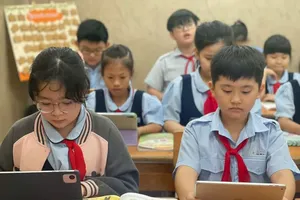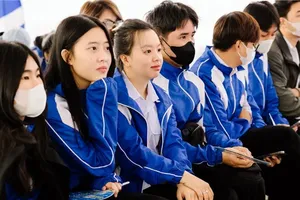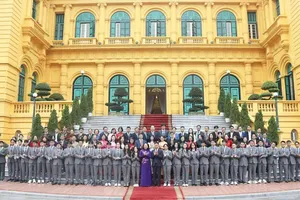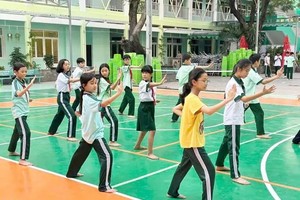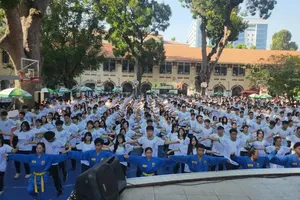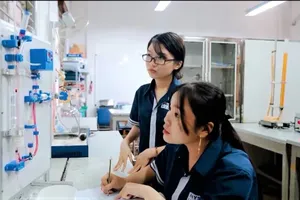Schools in HCMC started implementing the resolution in the academic year of 2023-2024.
Workforce reduction
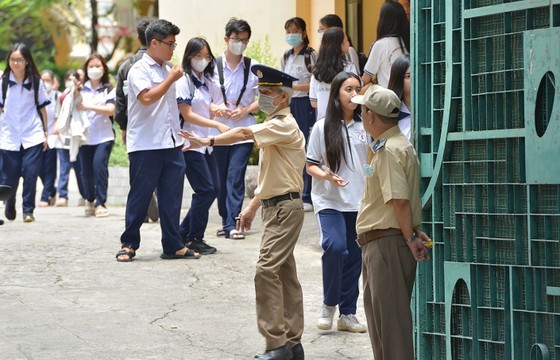 |
| Security guards of Tran Dai Nghia High School for the Gifted, District 1, HCMC. Photo: Cao Thang/ SGGP |
The 2018 General Education Program has now been implemented in 9 out of 12 grades. In particular, the primary school program requires teaching 2 sessions a day, with English and Information Technology being compulsory subjects from grade 3 onwards. Fee collection for the second session in grades 1, 2, 3, 4 following this program is not allowed; nor are fees collected for studying English and IT in grades 3 and 4. However, the budget allocated for supporting each student is affected by declining revenue, as the number of primary students has decreased sharply this year. Schools across the city, thus, are facing many difficulties in paying salaries for non-payroll staff.
Following the policy of staff streamlining at public service units, a primary school in District 1 reduced from 3 security guards to 2, using the same nannies and service staff for different grade levels. After reducing personnel, the school must sign contracts with new security and service staff and pay salaries for them, which was previously funded by the state. Meanwhile, those who were downsized shall receive severance pay according to Decree 108/2014/ND-CP (November 20, 2014) of the Government and regulations on specific support according to Resolution 25 of the HCMC People's Council.
In response to this situation, Head of the Department of Education and Training of Go Vap District, Mr. Trinh Vinh Thanh, explained that up to now, security guards and school service staff have worked under contracts with an indefinite term according to Decree 68/ 2000/ND-CP of the Government. However, when implementing the staff streamlining policy, these personnel are not on the payroll of public service units. Therefore, schools must make a contract to hire staff according to the actual needs of the unit, developing internal spending regulations, and allocating parts of the unit's revenue (from boarding fees or money for organizing extracurricular activities) to pay salaries for the staff. Schools with more branches and located in complex residential areas have to employ more security guards and service staff, hence they bear heavier financial burden.
Lack of school cleaning staff
Last week, on a student parent forum with nearly 10,000 members, Ms. B.N., a parent whose child is in grade 3 in N.Q Primary School (Binh Tan District) reported that the toilet was so dirty and smelly that her child did not dare to go to the toilet, which negatively affected his health. Afterwards, the school quickly addressed the problem and called for higher hygiene awareness among students in the school. This is also a common situation among many school toilets because they have to serve an overwhelming number of students during recess, while the number of cleaning staff is limited due to the heavy burden in paying salaries.
Currently, there are 4 to 10 toilets per school on average, with 2 separate areas for male and female students each. Compared to high school and middle school students, who aged 11 to 18, primary students' hygiene awareness is not high, hence a larger workload for the school cleaning staff. However, their salary under short-term contracts only ranges from US$205 to $288 (VND5 to 7 million) per person per month, which is not enough to retain these employees. To solve this problem, some schools use revenue from parents to invest in upgrading toilets and paying salaries for school cleaning staff. Nevertheless, this method has been disapproved by the management agency, because according to Clause 4, Article 10, Circular 55/2011 of the Ministry of Education and Training, money donated from students and their families can only be used for the activities of the student parent board, not for cleaning classrooms and schools. This, as a result, necessitates a pragmatic budget management in schools so that both hygiene issues and salary for workers are ensured.
According to Deputy Head of the Department of Education and Training of Tan Binh District, Phan Van Quang, not only schools but also other public service units, including the Department of Education and Training, are affected by the policy of staff streamlining. Therefore, each unit must strictly follow the rules of openness and democracy in establishing internal spending regulations to pay salaries to the non-payroll workforce at the unit.


